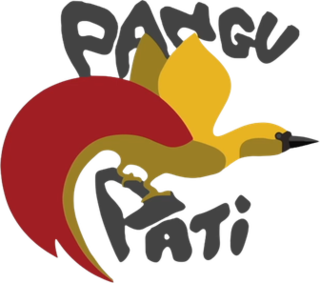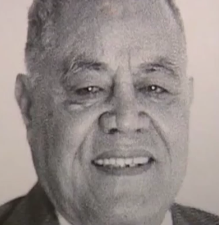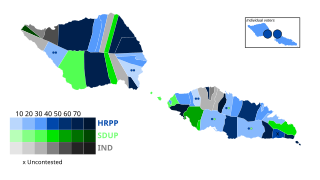
The Social Democratic Party is a political party in Japan that was established in 1996. Since its reformation and name change in 1996, it has advocated pacifism and defined itself as a social-democratic party. It was previously known as the Japan Socialist Party.

The Pangu Pati, officially Papua na Niugini Yunion Pati, is a nationalist and developmentalist political party on the centre-left in Papua New Guinea. The party is the oldest political party in Papua New Guinea and has held all levels of government throughout its history. As of 2023, it is the largest party in the National Parliament.

Mititaiagimene Young Vivian is a Niuean politician and diplomat, who served as Premier of Niue twice, the first time from December 1992 to March 1993 following the death of Sir Robert Rex, and the second from 2002 to 2008. He also served as a Cabinet Minister multiple times, first as Minister of Education, Economic Development and Agriculture and later as Minister of Finance under Robert Rex, and in the Cabinet of Sani Lakatani. From 1979 to 1982 he served as Secretary-General of the South Pacific Commission.

The People's Alliance Party (PAP) is a political party in the Solomon Islands.
Sir Thomas Robert Alexander Harries Davis was a Cook Islands statesman and medical researcher. He served as Prime Minister of the Cook Islands from 1978 to March 1983, and again from November 1983 to July 1987. He also worked as a medical officer, and as a medical researcher for the US Army and NASA. He was a founder of the Cook Islands Voyaging Society and constructed and voyaged in several replica vaka, including Tākitumu and Te Au o Tonga.

Albert Royle Henry was the first Premier of the Cook Islands and the founder and first leader of the Cook Islands Party (CIP). First elected Premier in August 1965, he was unseated in the aftermath of the 1978 election after an electoral petition found he had committed electoral fraud. He was later stripped of his knighthood. In 2023 he was posthumously pardoned.

Vaʻai Kolone was the fourth prime minister of Samoa and a founder of the Human Rights Protection Party (HRPP) in Samoa. He served as Prime Minister twice, first between 13 April and 18 September 1982, and then from 30 December 1985 until 8 April 1988.

The Christian Democratic Party (CDP) was a political party in Samoa. The party was founded in February 1985 by the supporters of former Prime Minister Tupuola Taisi Tufuga Efi. At the 1985 election the party won only 15 of 47 seats, but was able to form a coalition government in December 1985 after 11 Human Rights Protection Party MPs crossed the floor to vote against the budget of then-Prime Minister Tofilau Eti Alesana. Va'ai Kolone became Prime Minister. While apparently retaining a majority after the 1988 election, the party lost power after the defection of Tanuvasa Livigisitone to the HRPP.

General elections were held in Samoa on 31 March 2006 to determine the composition of the 14th Parliament. The main contesting parties were that of incumbent Prime Minister Tuilaʻepa Saʻilele Malielegaoi, of the Human Rights Protection Party (HRPP); and the Samoan Democratic United Party (SDUP). In addition, three other parties, the Christian Party (SCP), the Samoa Party (SP), and the Samoa Progressive Party (SPP), competed in the election. The result was a landslide victory for the HRPP, which won 33 of the 49 seats. The newly founded SDUP secured ten seats, and the remaining six were won by independents. After the election, three independents joined the HRPP, increasing the party's seat count to 36.

General elections were held in Samoa on 2 March 2001 to determine the composition of the 13th Parliament. Prime minister Tuilaʻepa Saʻilele Malielegaoi led the Human Rights Protection Party (HRPP) into the election. Opposition leader and former prime minister and future head of state, Tui Ātua Tupua Tamasese Efi led the Samoan National Development Party (SNDP) into the election. The HRPP won 23 seats, but initially fell short of a majority. The SNDP won 13 seats, the Samoan United People's Party secured one seat and the remaining 12 were won by independents. Following the election, all 12 independents joined the HRPP, giving the party a majority in parliament and allowing Tuila'epa to remain prime minister.
Here Ai’a, also known as Te Pupu Here Ai'a Te Nunaa ia Ora, is a pro-independence political party in French Polynesia. It was founded by John Teariki and Henri Bouvier in 1965 following the banning of the pro-independence Democratic Rally of the Tahitian People (RDPT) by the colonial French government. Supported mainly by rural Polynesians, the party was a significant force in French Polynesian politics from its foundation until the early 1980's, before entering a decline following Teariki's death in 1983. The party is currently led by Gustave Taputu.

Tuiletufuga Le Mamea Ropati Mualia is a Samoan politician, and member of the Council of Deputies. He has served as a Cabinet Minister, Leader of the Opposition and represented the constituency for Lefaga & Falese'ela for over thirty years. He was a founding member of the Human Rights Protection Party.

The Samoa Liberal Party was a political party in Samoa. It was founded in June 1993 by three MPs expelled from the Human Rights Protection Party for crossing the floor and voting against part of the government's budget. The party's first leader was Nonumalo Leulumoega Sofara.
Norman George is a Cook Islands politician and former Speaker of the Cook Islands Parliament, Deputy Prime Minister, and Cabinet Minister.

General elections were held in the Cook Islands in January 1989 to elect 24 MPs to the Parliament. The elections saw the Cook Islands Party win 12 seats, the Democratic Tumu Party win 2 seats, and the Democratic Party-led opposition coalition win 9 seats. One seat was won by an independent. Following the elections, the Democratic Tumu Party supported the CIP, and Geoffrey Henry became Prime Minister for the second time.
Aʻeau Peniamina Leʻavai is a Samoan politician and matai. He served as the Speaker of the Samoan Legislative Assembly from 1988 to 1991. He is a member of the Tautua Samoa Party.

General elections were held in Western Samoa on 26 April 1996 to determine the composition of the 12th Parliament. The election occurred following constitutional amendments that extended the parliamentary term from three to five years and increased parliament's seat count from 47 to 49. Five parties contested the election, including the governing Human Rights Protection Party (HRPP), led by Prime Minister Tofilau Eti Alesana and the main opposition, the Samoan National Development Party (SNDP), led by Tui Ātua Tupua Tamasese Efi. The HRPP's popularity suffered a setback due to Chief Auditor Sua Rimoni Ah Chong's 1994 report, which brought to light government corruption. While the SNDP campaigned on anti-corruption, the party's perceived failure to provide checks on the HRPP meant the governing party faced few obstacles to re-election.

The Constitution of Samoa is a written constitution which is the supreme law in Samoa. It establishes Samoa as a parliamentary republic with a Westminster system and responsible government. It outlines the structure and powers of the Samoan government's three parts: the executive, legislature, and judiciary.

General elections were held in Western Samoa on 5 April 1991, to determine the composition of the 11th Parliament. The elections were the first since the introduction of universal suffrage following a referendum held the previous year. However, candidates were still required to be Matai. The two main parties were the governing Human Rights Protection Party (HRPP), led by Prime Minister Tofilau Eti Alesana and the opposition Samoan National Development Party (SNDP), led by former Prime Minister Tupua Tamasese Efi.

Jacqui Drollet is a French Polynesian politician, independence campaigner, and former Cabinet Minister. He was Minister of Health from 1987 to 1991, and President of the Assembly of French Polynesia from 14 April 2011 to 16 May 2013.











